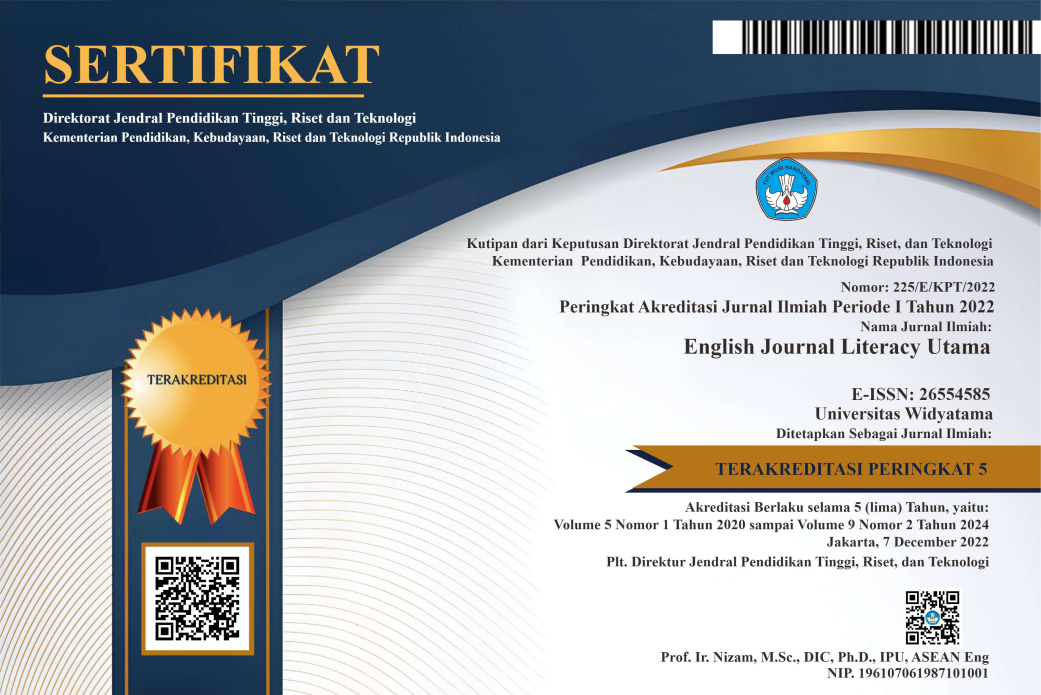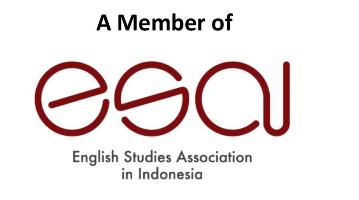PROMOTING STUDENTS’ INDEPENDENT LEARNING STRATEGIES IN FACING ONLINE LEARNING: STUDENTS’ VOICES
DOI:
https://doi.org/10.33197/ejlutama.v7i2.200Keywords:
Independent learning strategy, online learning, narrative inquiry, students' voicesAbstract
This study, utilizing a narrative inquiry approach, explores the perceptions of eighth semester English education students regarding online learning activities facilitated by their instructors over a period of twenty months during the Covid-19 pandemic. The participants included 30 students who were engaged in online learning during the pandemic. The study employed three audio-recorded post-teaching conferences and three guided group interviews to gather data on the participants' online learning experiences during the pandemic. The qualitative data was analyzed using content analysis techniques. The results indicated that, in addition to the challenges that arise in online learning, such as mastery of learning materials and the volume of assignments given by instructors, students also expected more detailed feedback from their instructors across various teaching contexts, for several reasons. The findings suggest that differences in perceptions regarding online learning and the need for students to develop more independent learning strategies and recommendations are important topics for further discussion.
References
Bautista, L. N. N. (2019). Asian EFL Journal Research Articles. Vol. 23 Issue No. 3.3 May 2019. 23(3), 142–154.
Danso, J. (2017). Developing students ’ independent skills through the use of Assessment for Learning strategies?: How does this affect engagement?? MSc Learning and Teaching 2017.
Gill, G. K., & Halim, N. (2007). The “ I ” in Independent Learning?: The Rise of Self-Managing Learners. AARE 2007 Conference, Fremantle Research Impacts: Proving or Improving, 1–17.
Harmanto, H., Yulianto, B., Sholeh, M., Subekti, H., & Sueb, S. (2022). Strategies to Implement Independent Learning Programs: A Reflective Study on Ministerial Programs. Proceedings of the Eighth Southeast Asia Design Research (SEA-DR) & the Second Science, Technology, Education, Arts, Culture, and Humanity (STEACH) International Conference (SEADR-STEACH 2021), 627, 346–352. https://doi.org/10.2991/assehr.k.211229.054
Harvey, V. S., & Wolfe, L. A. C. (2007). Working with Students to Promote Independent Learning. Fostering Independent Learning: Practical Strategies to Promote Student Success, 1–23.
Hendri, S., & Setiawan, W. (2016). the Development of Earth Quake Teaching Material for Junior High School By Four Step Teaching Materials Development Method Pengembangan Bahan Ajar Tema Gempa Bumi Menggunakan Four Step Teaching Materials Development. 12(1), 65–76. https://doi.org/10.15294/jpfi
Nikmah, R., Fitriawan, F., & Witasari, R. (2021). Vol.1 No.2 (2021). 1(2), 161–167.
O’DONOGHUE, G. (2017). Starting self-starters: Strategies to support independent learning. University of Sydney Papers in TESOL, 12, 81–121. http://search.ebscohost.com/login.aspx?direct=true&db=ehh&AN=125098451&site=ehost-liv
Oishi, I. R. V. (2020). Pentingnya Belajar Mandiri Bagi Peserta Didik Di Perguruan Tinggi. IKRA-ITH Humaniora, 4(2), 50–55.
Putra, R. A., Kamil, M., & Pramudia, J. R. (2017). PENERAPAN METODE PEMBELAJARAN MANDIRI DALAM MENINGKATKAN HASIL BELAJAR PESERTA DIDIK (Studi pada Program Pendidikan Kesetaraan Paket C di PKBM Bina Mandiri Cipageran). Jurnal Pendidikan Luar Sekolah, 1(1), 23–36.
Tekkol, I. A., & Demirel, M. (2018). An investigation of self-directed learning skills of undergraduate students. Frontiers in Psychology, 9(NOV), 1–14. https://doi.org/10.3389/fpsyg.2018.02324
Downloads
Published
Issue
Section
License
Copyright (c) 2023 Ratih Inayah, Sri Supiah Cahyati

This work is licensed under a Creative Commons Attribution-NonCommercial-ShareAlike 4.0 International License.
Creative Commons Attribution-ShareAlike 4.0 International License















